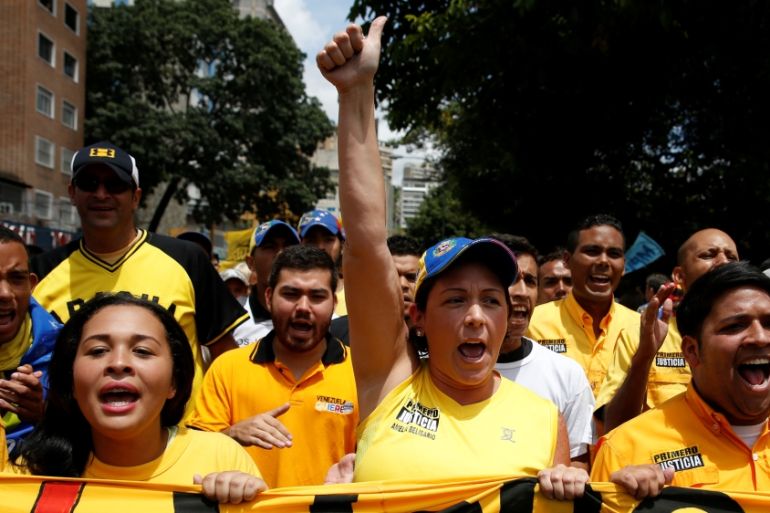Venezuela’s opposition clears hurdle to recall Maduro
Opposition makes progress in effort to remove President Nicolas Maduro, but referendum still a long way off.

Venezuela’s opposition has been given a green light to proceed with efforts to remove President Nicolas Maduro in a referendum, but the country still appeared far from holding a vote.
|
|
The National Electoral Council (CNE) said on Monday that the opposition had collected nearly double the requirement of 200,000 valid signatures on a petition demanding Maduro face a recall referendum.
Keep reading
list of 4 itemsIndia-Iran port deal: A gateway to Central Asia or a geostrategic headache?
India’s income inequality widens, should wealth be redistributed?
Facebook, Instagram face EU scrutiny over addictive effects on children
“We still don’t know if we will be seeing a referendum. It is not guaranteed yet,” Al Jazeera’s Daniel Lak, reporting from the capital Caracas, said.
“But this is a big step forward by an opposition alliance which has basically been opposing not just President Maduro but his predecessor Hugo Chavez.”
The CNE did not set a date for the next stage of a lengthy process in which the opposition must collect four million signatures in just three days.
And, in a boost to the Maduro camp’s claims of rampant fraud, CNE chief Tibisay Lucena said the authorities had detected more than 1,000 apparently fraudulent signatures.
The opposition blames Maduro for an economic implosion that has seen severe food shortages, a healthcare crisis, hyperinflation, violence and looting in a once-booming country that is home to the world’s largest oil reserves.
The opposition is racing to force a referendum by January 10, the cutoff date to trigger new elections — four years into the president’s six-year term.
After that date, a successful recall vote would simply transfer power to Maduro’s hand-picked vice-president.
A recent poll found 64 percent of Venezuelans would vote to remove Maduro. But, the opposition accuses the electoral authority of being sympathetic to Maduro.
The opposition won legislative elections in December, only to find its power stymied by the Supreme Court, which it says is also in Maduro’s pocket.
READ MORE: The faces of the Venezuelan crisis
Separately, Venezuela’s Supreme Court declared the opposition-held National Assembly in contempt on Monday for ignoring its rulings by swearing in three MPs who were suspended over alleged electoral fraud.
The court said all actions of the National Assembly are void until banned members are removed from office.
The opposition accuses the court of using baseless fraud accusations to quash the powerful two-thirds majority it won in legislative elections in December.
Venezuela’s Supreme Court has almost always ruled in favour of the government during the last 17 years of socialist rule under Maduro and his predecessor, Hugo Chavez.
The opposition coalition pushing the referendum, the Democratic Unity Roundtable (MUD), can now formally request the process go ahead – which they must do within two days.
The electoral council will have 15 days to respond, then 15 working days to set the dates and locations for the second petition drive.
After the second petition is complete, the council will have another 15 business days to count and validate the signatures.
Then it is supposed to set a date for a referendum within three months.
READ MORE: Venezuelan army takes over food distribution services
To win, Maduro’s opponents would need more votes than he won the presidency with in 2013 — around 7.5 million.
His allies have an arsenal of possible delaying strategies. They have filed more than 8,000 legal challenges against the recall petition and called on the electoral authorities to ban MUD for alleged fraud.
|
|